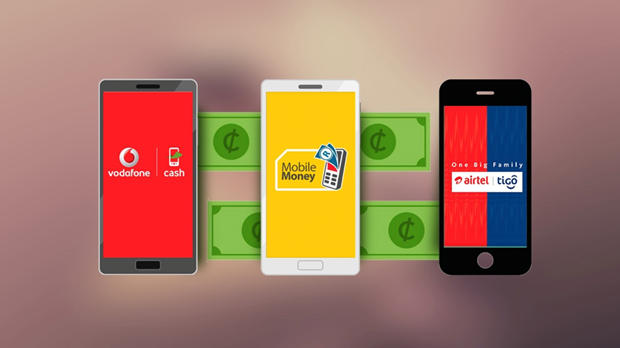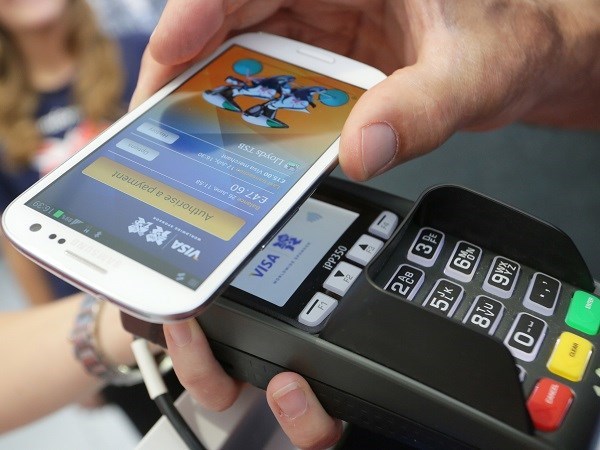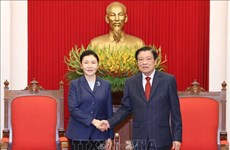Online payment via telecom accounts poses challenges
 Illustrative image (Source: Techtodaygh.com)
Illustrative image (Source: Techtodaygh.com)
Hanoi (VNA) - Speaking at a conference with the Ministry of Information and Communications on January 15, Prime Minister agreed to pilot the use of telecommunication accounts to pay for goods and services with small value. At first, the pilot scheme will be implemented by at least a telecom business.
This is good news for dozens of millions of Vietnamese people in general and telecom service providers in particular. As once the service is implemented, people’s buying of goods, air tickets, going to markets and travelling will be convenient as they only need to take along a mobile phone, not cash.
Inevitable trend
Mobile money is a global trend, especially in developing country. This has contributed to socio-economic development and also brought a chance to access the service to millions of households, thus reducing cash using habit in daily exchanges. This is a promising model with those who do not have a bank account.
China is one of the countries with fast growth of e-payment in recent years. The country is currently having 84 percent of e-payment transactions. Alibaba group itself earns dozens of billions of USD from this method of payment.
Minister of Information and Telecommunications Nguyen Manh Hung said the Ministry will pilot Mobile Money, allowing mobile users to use mobile to transfer money and buying goods via their mobile accounts. He said this will enable people to access e-payment wherever they are and stimulate the country’s economy.
According to experts, payment via mobile phone account is considered an opportunity for network operators, digital content businesses to develop strongly after a long time being "limited," and also an opportunity for telecom enterprises to invest in Fintech (financial technology) which is considered to be very potential in developing countries like Vietnam.
Currently, telecommunication accounts are only used to pay for telecommunications services and value-added services based on telecom networks. Therefore, if we can use telecom accounts to pay for goods with small value, we can immediately implement electronic payment nationwide, avoiding the risk of foreign partners entering Vietnam and dominating e- payment area.
Answering VietnamPlus e-newspaper reporter, Mr. Pham Trung Kien, Viettel Telecom's Deputy General Director said that this is really a great opportunity and Viettel is ready for that.
Kien further said, currently the number of people with bank accounts is low, especially, in rural areas where only about 30-40% of people have bank accounts. However, the coverage of telecommunications reaches nearly 100% of the population. On the other hand, banks, payment intermediaries and electronic wallets are now focusing on urban areas. Even in some disadvantaged places, people have never heard about electronic payment.
In addition, e-wallets and e-banking service often operated on smart phones, while smart phone users in Vietnam account for only about 40% of the population. Among the users, those using 3G/4G and having Google and Apple accounts to download applications account for only about 20-30% of the population. Thus, Kien said he thinks that about 70-80% of the population has not yet had access to electronic payment via mobile.
"Applying payment via telecom account means that nearly 100% of the population can immediately spend on daily activities such as drinking coffee or having breakfast, Kien said.
The Viettel Telecom's leader also shared that recently, his group has piloted a car parking project in cooperation with the Hanoi People's Committee and Ho Chi Minh City People's Committee. Over 90 percent of the service users use their mobile accounts for payment even when they have both bank and mobile accounts.
Therefore, the Prime Minister’s approval to pilot the use of telecom payment accounts is expected to be a boost for Vietnam's electronic payment industry.
What will Mobile Money face?
The development of electronic payment in general and mobile payment in particular in Vietnam has been relatively positive so far. However, mobile payment also poses many challenges related to legal framework, security in transactions, confidentiality of information, transactions between countries, hi-tech crimes and digital sovereignty of each country.
Many experts believe that this form of payment is a loophole for criminals to conduct illegal transactions or attack service providers themselves.
 Illustrative image (Source: itnewsafrica.com)
Illustrative image (Source: itnewsafrica.com)Regarding concerns about unusual transactions that may occur when using this service, Kien said that when deploying electronic payment services, the providers must have measures to monitor any unusual transactions, manage risk and deploy multi-layer security solutions to ensure safety for users.
Vu Hoang Lien, Chairman of Vietnam Internet Association also said that using Mobile Money in payment is very beneficial and an inevitable trend. However, the level of security on mobile phones is currently very low. Smart phones are becoming too common, users are not overly concerned that security is one of the main causes of unsafe deployment.
"Mobile phones are something that is tied to trends. And I believe technological crimes will continue to develop to violating the law," Lien stressed./.
| According to Global Mobility Association, Mobile Money is defined as services financially connected to customer via mobile networks. Mobile Money includes mobile payment services (retail transactions and bill payments), mobile money transfers, money transfers between subscribers, small credit transactions, and account management via mobile phones and similar services./. |













